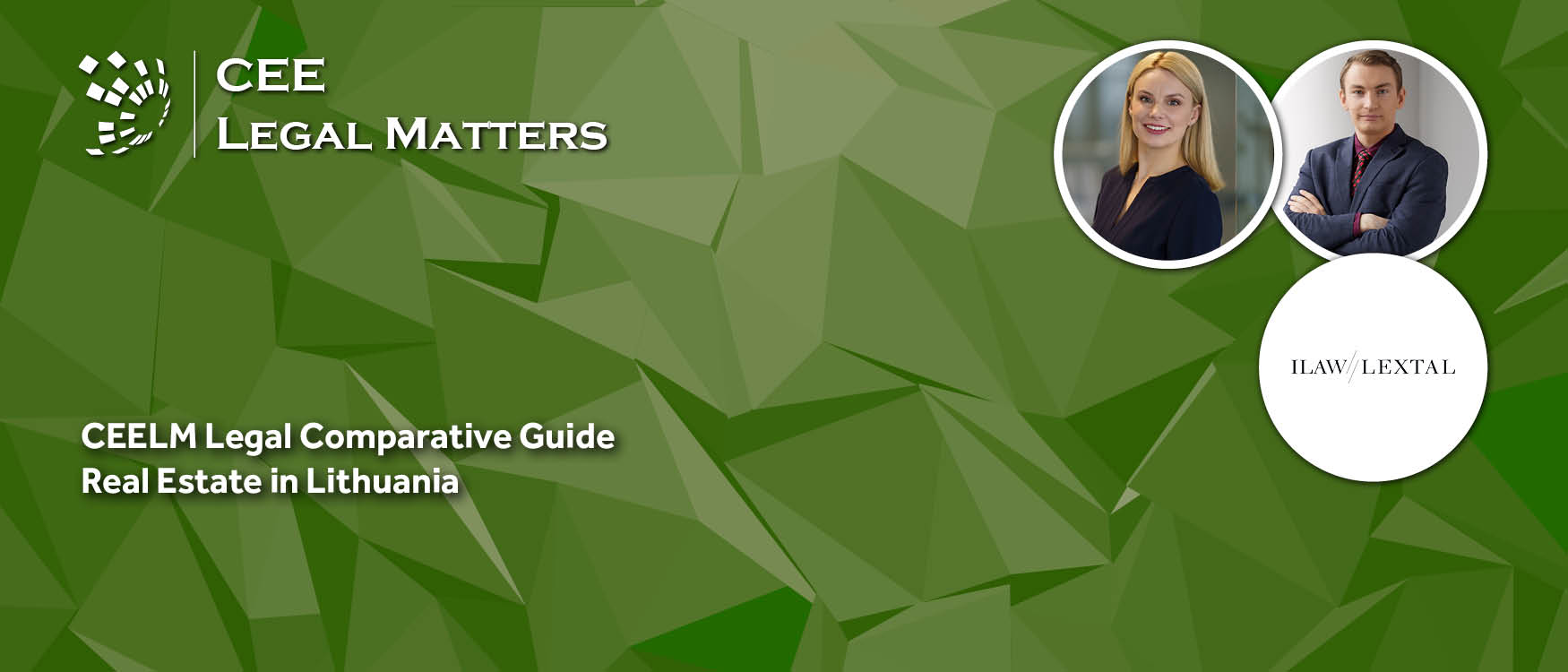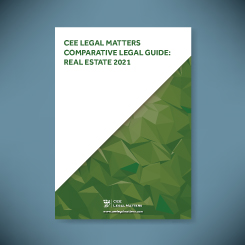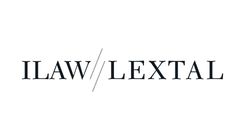Contributed by ILAW Lextal.
1. REAL ESTATE OWNERSHIP
1.1 Legal framework
Key sources of law
Real estate ownership (and ownership in general) is a constitutional value - Article 23 (1) of the Constitution of the Republic of Lithuania explicitly states that property is inviolable. However, ownership rights are not absolute – they can be limited in certain exceptional cases of public interest or if it is necessary for a democratic society.
When it comes to the management, use, and disposal of real estate, the Civil Code of the Republic of Lithuania sets forth the main principles and regulates almost every common transaction – sale-purchase agreements, lease, mortgage, etc. The Civil Code has been amended many times since it entered into force, although most amendments are related to tort and law on obligations. Laws regarding ownership and property rights are rarely changed (the biggest change was the reform of the mortgage institute back in 2012).
The Law on Land of the Republic of Lithuania also sets forth some specific rules regarding the acquisition of certain land, its disposal, and other special rules. Some other legal acts might be also applicable depending on the situation. These special legal acts, in comparison, are amended quite often.
Equality of real estate owners
If a person has ownership rights to a real estate object, they have more rights than a person that has the right of usus fructus or servitude. Most secondary in rem rights (mortgage, servitude, usus fructus, emphyteusis, and so on) contain restrictions for the rights of owners. For example, a person with usus fructus rights cannot sell the property, although they have the right to receive income the property generates; if a person has a right to use the property of another person under the grounds of servitude, they cannot receive income from that property, sell it, etc.
Restrictions of real estate acquisition for foreigners
The Constitution of Lithuania and its implementing acts set some limits for the acquisition of land for foreigners. The purchase of land in Lithuania is only allowed to a person or a legal entity coming from a country that is a member of at least one of the following alliances or organizations: the European Union, the North Atlantic Treaty Organization, the Agreement on the European Economic Area, the Organization for Economic Co-operation and Development.
Expropriation of ownership. Trends in the market.
Expropriation, in cases when a property is taken away without any compensation, or the compensation does not meet market values, is not legal in Lithuania. The law sets exceptional cases allowing to take the property for public needs, but the owners must be duly compensated. Proper compensation is evaluated individually in every case, although the state can take the property before paying the compensation and the owner can only claim the compensation amount. The procedure is strictly regulated and procedural infringements from the state can result in the reversal of the acquisition or the ability for the owners to claim extra damages.
Most of the time land is taken for public needs when projects of state importance face private property as an obstacle (e.g. certain under or on-ground electricity grid lines need to be constructed, although part of the gridline falls into private property). Despite that, there are situations when land is taken for public use in the context of lower-priority projects, although in such cases public institutions are forced to provide clear and justified motives for such acquisition.
This year Lithuanian residential real estate market experienced a high rise – the prices of residential and logistic real estate have increased significantly since 2020. Some residential property in Lithuania is bought for investment purposes to lease it out lately. Investors claim that they lack available land plots for development, as owners are not willing to sell their land expecting the prices to get even higher.
1.2 Registration of ownership
All real estate objects located in Lithuania must be registered in the Real Property Register and Cadastre of Lithuania. The Register is owned by the Government and the state enterprise “Registru centras” manages it. This register contains information such as cadastral data and maps, ownership and its history, property restrictions, etc. A separate public register is established for seizure acts and mortgages.
All real estate ownership rights, encumbrances must be registered in the public register for it to have legal effect against other third persons. For example, the law provides that the servitude shall take legal effect only from the moment of its registration, except the cases when the servitude is established by law.
1.3 Publicity of real estate register
Data in public registers is public but subject to some fees.
1.4 Protection of ownership
If certain legal facts are registered, they are presumed true and legally binding to all third persons. If, for example, a person disposes of a real estate object without having the right to do so (unauthorized disposal), such contract is null and void in general. In such cases the owner may claim the court to declare such a contract void and apply restitution – the parties are returned to the status prior to the conclusion of such an illegal contract (the sold property is returned to its rightful owner. If the property is gone, a monetary equivalent is paid). In the case of illegal use of private property, its owner can file a vindicatio or negatoria claim. In both cases, the owner can claim the damages that they suffered.
2. REAL ESTATE ACQUISTION
2.1 Share deal or asset deal?
Both share deals and asset deals are common in practice when it comes to real estate transactions. Asset deals are more common when a legal entity sells its property purely as real assets. Share deals are more common when a project related to the real estate in question is the target of the transaction. For example, in the case a land plot with a project under development is “on the table” (with signed design, construction agreements, etc.), in such a case a share deal is much more common in practice. Share deals allow the parties of the transaction to transfer the property without the need to change the design, construction agreements, agreements on infrastructure matters with a municipality, etc. When choosing between the share deal and asset deal tax aspects should be also taken into account.
2.2 Share deal
In the case of an acquisition of shares, it is always advised to conduct a due diligence procedure to minimize the risks of the buyer.
Most of the times risks are related to unknown debts of the company in which shares are purchased, certain claims to the seller, possible seizure of such shares or other property of the company due to debts, etc. Some risks might be addressed by certain warranties of the seller (for example a certain amount of liquidated damages in the case the creditors of the seller file an action Pauliana claim, etc.), however, for example, the responsibility to check public registers data lies on the buyer.
In the case shares are sold by a natural person, it is always suggested to double-check whether he/she is married, and, if that is the case, include the other spouse as a party of the contract, as if the shares were acquired during the marriage, as a rule, they are an object of joint ownership of spouses (if no wedding contract is in place).
Fees:
- Legal or other consultations fees (lawyers, audit and tax consultants, etc.);
- Notary fees for the transaction (0,33 % - 0,41 % from the transaction sum, but no more than EUR 5,000) (in some cases the share transaction can be concluded without the involvement of the notary).
Taxes:
- Personal income tax (if the shares are sold by a natural person).
- Profit tax (if the shares are sold by a legal entity).
2.3 Asset deal
Real estate deals in Lithuania are subject to notarial approval. In many cases, the parties enter into a preliminary agreement and the buyer pays an advance payment before going to the notary. If a complex real estate deal is in question the buyer is advised to conduct legal due diligence. In some cases, technical or even environmental due diligence might be required.
Fees:
- Legal fees (if any)
- Notary fees for the transaction (0,33 % - 0,41 % from the transaction sum, but no more than EUR 5,000).
- Registration of ownership in the state registers (in most cases not significant).
Taxes:
- Personal income tax of 15% (in the case real estate is sold by a natural person) with some exceptions, for example, personal income tax is not applicable if the property is kept in the ownership of the private person for not less than 10 years;
- Profit tax (if the real estate is sold by a legal entity).
2.4 Disposal process
Real estate sale-purchase or exchange agreements in Lithuania must be approved by a notary. A mandatory element of a real estate transaction is to specify the ability for the new owner to be able to reach (and use) his new acquired object (i.e. house or other structures), for example – lease of land, servitudes. If this is not discussed in a real estate ownership transfer agreement, such a transaction is also null.
The notary’s responsibility is to check the seller’s ownership rights and parties’ or their authorized representatives’ identities. Notary fees for the transaction range from 0,33 % to 0,41 % from the transaction sum, but no more than EUR 5,000.
If the sold property is an object of joint ownership, the co-owners have a preemptive right to acquire the part of the property under sale. The law sets some preemptive rights in the case agricultural or forest land is under sale, for example, the owners of the neighboring land plots have the preemptive right.
2.5 Registration of change of ownership
All changes of ownership must be registered in the Real Property Register. Once a notary approves a real estate transaction, the notary provides all the necessary information to the register himself. Registration fees as a rule are not significant.
2.6 Risks to be considered
All co-owners have pre-emptive rights to purchase the part of the object that is being sold. If encumbrances to a real estate object are not registered in the register, they have no legal effect on the new owner (the buyer).
In the case of defects of the acquired real estate, the buyer can claim the seller or, if the seller was not the entity/person that built the real estate object, claim the builder as well (the obligation for the builder to ensure the quality of the real estate object during its warranty period is an erga omnes type of obligation, disregarding who the owner of the object is). If no progress is made (the defects are not fixed or remedies are not paid out), claiming the courts for damages is the only option.
3. REAL ESTATE FINANCING
3.1 Key sources of financing
Most of the time the acquisition of real estate is financed by banks.
The development of real estate is financed not only by banks but various private and investment funds, private and cooperate creditors. Emissions of securities, such as bonds, for real estate projects financing become more and more popular in Lithuania as well.
3.2 Protection of creditors
Most of the time investors use mortgages of the land and build property to secure their credits. Group companies’ and other persons’ guarantees might be also used, and as a result, liquidated damages can be claimed not only to the real estate developer but also to its guarantors.
4. REAL ESTATE TAXES
4.1 Transfer taxes
As mentioned before, for real estate disposal a personal income tax (in most cases – 15%) is applied. Keep in mind that certain exceptions when one does not get taxed apply.
Company income tax might be also applicable depending on individual situations.
4.2 Specific real estate taxes
Real Estate tax applies, and it is paid every year depending on rules set by local municipalities. It ranges from 0,5% to 3% from the value of the real estate object.
5. CONDOMINIUMS
5.1 Legal framework for condominiums
Condominiums do exist in the Lithuanian jurisdiction. Most of the related questions are regulated by the Civil Code of the Republic of Lithuania and a special legal act – Law on Associations of Owners of Multi-Apartment Residential Houses and Other Purpose Buildings of the Republic of Lithuania.
5.2 Rights and duties of co-owners
The law provides that a specific legal entity – a residential home association, can be established to manage condominiums. The entity as a subject of legal relations is not liable for its obligations – all liabilities lie with its members and, in some cases, the owners of the flats even if they are not members of the association.
The co-owners and members of the association have the right to participate in the meetings and vote regarding the use, management, and disposal of the commonly used areas of the building.
Their duty is to pay for certain services that either the association decided on their own discretion (this duty applies only to the members of the association) or if it’s mandatory for the upkeep of the building (such duty applies to all co-owners of the building despite the fact if they are not members of the association).
Co-owners also have the right to decline membership in the association, although that does not relieve them from obligations, which are related to the mandatory maintenance of the commonly used areas of the building.
5.3 Liability of co-owners
All liabilities (for payment of certain services, maintenance of the building, and so on) lie with its members. The owners of the flats that are not part of the association are only obliged to pay for mandatory upkeep services of the building (mandatory restoration of commonly used areas, the building itself, and so on). If the restoration or improvement was not mandatory, such a co-owner that is not a member of the association and does not take part in the meetings of the association does not have an obligation to pay.
5.4 Rights and duties of condominium associations
The associations are specific legal entities that only represent the co-owners, although contractual relations and other legal relations are bound with the co-owners.
6. COMMERCIAL LEASES
6.1 Form and contents of a lease agreement
Most real estate lease agreements are concluded in writing. The key clauses of leases relate to rent and other payments, lease term, obligations of the parties, insurance, unilateral termination (exit opportunities), remedy for the improvements made to the leased object, etc.
6.2 Regulation of leases
General rules applicable for all lease agreements are stated in the Civil Code of Lithuania. The main rule is that the leased real estate object must be identified in the contract (its location, unique number, cadastral number, specific premises or area of the object that is leased, etc.).
However, the lease of land has specific rules. A land lease contract shall not provide for:
1) authorization issued to the lessee to represent the owner of the land and dispose of the land and any other immovable property situated on the land;
2) the right of a lessee of land to change the main purpose of land.
Land lease also has exceptions regarding unilateral termination of the contract (if that question is not specified in the land lease agreement) – if the lessee does not pay for three months in a row, the lessor can terminate the contract unilaterally. Otherwise, unilateral termination of the contract is allowed only when the other contracting party breaches its clauses materially.
6.3 Registration of leases
It is not mandatory to register a commercial lease, however, if a written lease agreement is registered in the Real Property Register, new owners of the property must comply with the obligations set in the lease agreement.
6.4 Termination of leases and renewals
A commercial lease agreement can be terminated in the order specified in the lease agreement itself. In most cases, the parties agree that a commercial lease agreement can be terminated if the other party materially breaches the agreement.
The law regulates specific lease agreements, such as land lease, providing that unilateral termination is valid if the tenant of the land fails to pay the rent for the period of three months. No such requirement is set in, for example, for the lease of commercial premises.
Automatic lease renewals are applicable if it is not specified in a contract otherwise. A contract of lease shall be considered to become concluded for an indefinite period where the lessee continues to use the property for more than ten days after the expiry of the period of the contract without any opposition from the lessor.
The law sets the preemptive right to renew the lease agreement for the tenant who duly performs its obligations.
6.5 Rent regulations and rent reviews
If not specified otherwise in a contract, the tenant pays for utilities and other services (cold and hot water, electric energy, gas, heating, and public utilities (disposal of garbage, lifts, cleaning of premises of communal use and territory, etc.)) and such payments are normally excluded from the rent.
The parties are free to agree on the rules for rent reviews. As a rule, commercial lease agreements specify that rent is subject to annual indexation due to the change of consumer price index.
6.6 Services to be provided together with the lease
The lessee has the right to demand from the lessor to ensure that services needed to use the leased premises according to their purpose are provided. Although the contracting parties can agree otherwise (e.g. that the lessee undertakes to ensure the flow of electricity or water at its own risk).
6.7 Fit-out works and their regulation
If a tenant is a natural person who takes on lease the property to carry out his activities, the fit-out costs and the paid rent are deemed as activity costs that can be deducted from the taxed income. Similarly, a company can include the costs of fit-out into its accounting. However, the tax implications of individual situations can vary a lot.
6.8 Transfer of leases and leased assets
Generally, there are no restrictions regarding the transfer of leased assets (despite the obligation to inform the tenant of the upcoming transfer). However, the parties are free to agree on specific rules, for example, that the tenant has the preemptive right to acquire the property. The law sets the preemptive right for the tenant of agricultural land.
As mentioned before, if the lease agreement is registered in the public register, the new owner becomes a party of the lease contract – all rights and obligations arising from the registered lease agreement are assigned along with the ownership transfer to the new owner.





